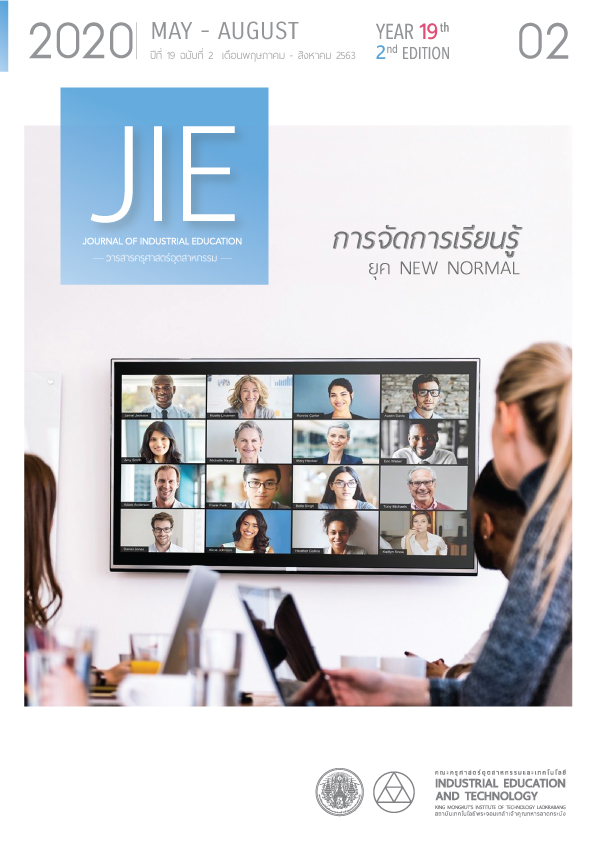NEEDS OF AGRICULTURAL LEARNING AND TEACHING INNOVATION DEVELOPMENT OF AGRICULTURAL TEACHERS IN SERVICE AREA SAKON NAKHON RAJABHAT UNIVERSITY
Keywords:
Needs for developing, Agricultural teaching/ learning innovation, Agricultural teachers, service area of Sakon Nakhon Rajabhat UniversityAbstract
The objectives of this study were to: 1) investigate personal factors of Agricultural teachers under the service area of Sakhon Nakhon Rajabhat University; 2) explore needs for developing agricultural teaching/learning innovation of the agricultural teachers; and 3) compare the needs for developing agricultural teaching/learning innovation and the personal factors. The sample group in this study consisted of 130 secondary school agricultural teachers. A set of questionnaire was used for data collection and analyzed by using mean, stand and deviation, t-test, and one-way ANOVA. Results of the study revealed that, as a whole, the respondents had a high level of needs for developing agricultural teaching/learning innovation ( = 4.41). There was no difference in needs for the development between male and female respondents There was no difference in the level of teaching of the respondents It was found that the level of teaching in agricultural teaching experience of the respondents had an effect on the difference in needs for developing agricultural teaching/learning innovation (sig. = 0.00). found that the respondents whose age range was 26-30 years, and their teaching experience was less than 3 years had less needs for developing agricultural teaching/ learning innovation than those of 16-20 years old, Those having teaching experience for 3-10, 11-15, 21-25, and 35 years and above had less heats for developing agricultural teaching/learning innovation than those of less than 3 years and 15 - 25 years of teaching experience.
References
Ministry of Education. 2008. Core curriculum for basic education, B.E. 2551. Bangkok : Printing House, Agricultural Cooperative Assembly of Thailand. Royal Academy. (1999). Computer terminology. Bangkok: Chulalongkorn Rajawittayalai Press.
Saisorn Srisukprasert 2000. Principles of Agricultural Education. Faculty of Education Kasetsart University. : 5-6.
Office of the Basic Education Commission 2008. Basic Core Education Curriculum 2008. Bangkok : Printing House of Agricultural Cooperative Assembly of Thailand. : 205
National Research Council of Thailand 2011. Research Strategy (2012-2016) Region northeast. (April). Bangkok : 9.
Yingsak Krai Pinitthirawat Chantuek and Pitak Siriwong. 2017.Modern agriculture management of Thailand. Journal of Research and Development, Valai Alongkorn under the Royal Patronage. Humanities and Social Sciences. Year 12, Issue 2: 115-125.
Boonchom Si Sa-at. 2010. Preliminary research. 8th edition, Bangkok: Suwiriyasarn.
Hatsadin Ritsongmuang. 2019. Need for competency development of agricultural teachers in northeast. Faculty of Industrial Education King Mongkut's Institute of Technology Ladkrabang: 65.
Rommanee Aphipirom. 1988. Methods of teaching agriculture. Faculty of Industrial Education Textbook Project. King Mongkut's Institute of Technology Ladkrabang: 1-11.
Ekachai Phutthasonson and Suwitida Charungkiatkul 2014. Trends of enhancing learning skills in the 21st century. For adult students. OJED, Vol. 9, No.4, 2014: 93-106.
Wirawan Yanphan. 1990. Principles of agricultural study. Bangkok: Phra Nakhon Teacher College.
Papert, S. 1990. “An Introduction To The 5th Anniversary Collection.” In Harel, I. (Ed.). Constructionist Learning: A 5th Anniversary Collection Of Papers. Cambridge, MA: MIT Media Laboratory.
Downloads
Published
How to Cite
Issue
Section
License
"The opinions and contents including the words in papers are responsibility by the authors."
"ข้อคิดเห็น เนื้อหา รวมทั้งการใช้ภาษาในบทความถือเป็นความรับผิดชอบของผู้เขียน"



